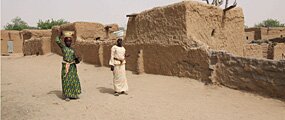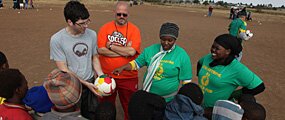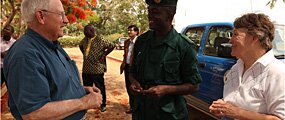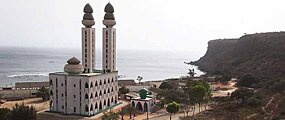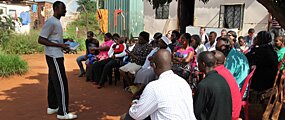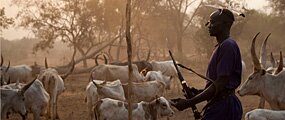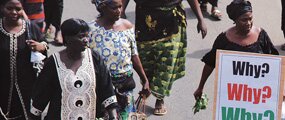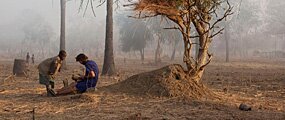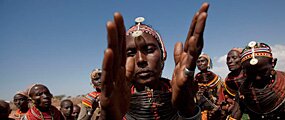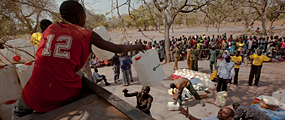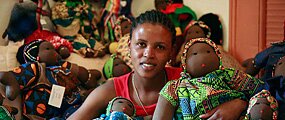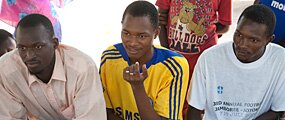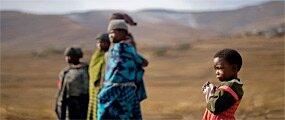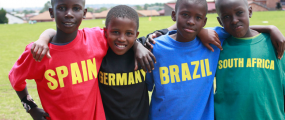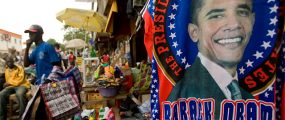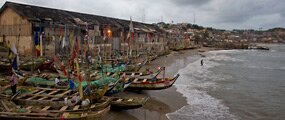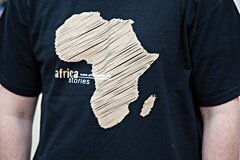People Group Profiles
Zulu
 Zulu means “people of heaven.” The Zulu are the largest South African ethnic group. Small numbers also live in Zimbabwe, Zambia and Mozambique. Zulu are well-known for their beautiful beadwork. Every color has a different meaning and a Zulu woman can weave a “message” into her bead creation. Dancing and singing are an important part of the lifestyle of the Zulu people. Each dance formation or movement symbolizes an event or happening within the clan. A traditional Zulu custom is to pass things to others using the right hand only, with the palm of the left hand under the right forearm.
Zulu means “people of heaven.” The Zulu are the largest South African ethnic group. Small numbers also live in Zimbabwe, Zambia and Mozambique. Zulu are well-known for their beautiful beadwork. Every color has a different meaning and a Zulu woman can weave a “message” into her bead creation. Dancing and singing are an important part of the lifestyle of the Zulu people. Each dance formation or movement symbolizes an event or happening within the clan. A traditional Zulu custom is to pass things to others using the right hand only, with the palm of the left hand under the right forearm.
Simple Zulu phrases:
Yebo – Yes
Cha – No
Unjani? (plural: Ninjani?) – How are you?
Kuhle – Good, fine
Xhosa
 About eight million people in South Africa speak Xhosa. To some people Xhosa seems difficult to learn because it contains “clicking” sounds. The word “Xhosa” comes from the Khoisan language, which means “angry men.” The Xhosa are patriarchal by tradition, with women subordinate to men. Married Xhosa women have the same rights as men to smoke tobacco in pipes, and can often be seen doing so. Traditional Xhosa cloth is almost always worn by women, mostly in the form of long skirts embroidered with horizontal black stripes placed at varying intervals.
About eight million people in South Africa speak Xhosa. To some people Xhosa seems difficult to learn because it contains “clicking” sounds. The word “Xhosa” comes from the Khoisan language, which means “angry men.” The Xhosa are patriarchal by tradition, with women subordinate to men. Married Xhosa women have the same rights as men to smoke tobacco in pipes, and can often be seen doing so. Traditional Xhosa cloth is almost always worn by women, mostly in the form of long skirts embroidered with horizontal black stripes placed at varying intervals.
Simple Xhosa phrases:
Ewe – Yes
Hayi – No
Enkosi – Thank you
Kunjani? – How are you?
Kulungile – Good, fine
Tswana
 The majority of Tswana people live in South Africa and Botswana. The Tswana are noted for their number of clans, each with their own culture and dialect. Certain elements of Tswana culture bind them, such as the use of cattle as currency and similar traditions of ancestral worship. In traditional Tswana society, a Tswana does not think in terms of individual rights, but of responsibilities to his family and tribe.
The majority of Tswana people live in South Africa and Botswana. The Tswana are noted for their number of clans, each with their own culture and dialect. Certain elements of Tswana culture bind them, such as the use of cattle as currency and similar traditions of ancestral worship. In traditional Tswana society, a Tswana does not think in terms of individual rights, but of responsibilities to his family and tribe.
Simple Tswana phrases:
Dumela – Hello
O a re eng? – How’s it going?
Ga ke re seppe – It’s going well
O mang? – What’s your name?
Leina la me ke _______ – My name is ________
Sotho (Southern and Northern)
 There are two major branches of Sotho, the Southern Sotho and the Northern Sotho. The home of most Southern Sotho is in Lesotho or in South Africa’s Free State Province. The Sotho people are recognized for their thick blankets and conical hats. Sotho have a rich tradition of folktales and praise poems. One of the best-known folktales is about a boy named Sankatana who saves the world from a giant monster. Names in Sotho generally have meanings that express values. Common personal names include Lehlohonolo (Good Fortune) and Mpho (Gift).
There are two major branches of Sotho, the Southern Sotho and the Northern Sotho. The home of most Southern Sotho is in Lesotho or in South Africa’s Free State Province. The Sotho people are recognized for their thick blankets and conical hats. Sotho have a rich tradition of folktales and praise poems. One of the best-known folktales is about a boy named Sankatana who saves the world from a giant monster. Names in Sotho generally have meanings that express values. Common personal names include Lehlohonolo (Good Fortune) and Mpho (Gift).
The Northern Sotho people live primarily in the northern part of South Africa called Limpopo. They are well-known for their melodic music called dinaka. According to tradition, a man named Dinaka loved to dance and sing and made instruments specifically designed for his music. When Dinaka died, his music was loved so much that it continues to this day.
Simple Southern Sotho phrases:
Kena ka kgotso – Welcome
O phela joang? – How are you?
Ke phela hantle, wena o phela jwang? – I’m living fine, how are you living?
Lebitso la hoa ke mang? – What’s your name?
Lebitso laka ke ______ – My name is ________
Simple Northern Sotho phrases:
Dumela – Good morning/afternoon/evening (to one person)
O kae? – How are you? (to one person)
Ke gona – I’m fine
Sala gabotse – Goodbye (Stay well)
Ke a leboga – Thank you
Herero
 The Herero are traditionally cattle-herding pastoralists. The main group of Herero in Namibia was heavily influenced by Western culture during the colonial period, creating a mixture of the European and Herero cultures. The Herero women of Namibia traditionally wear Victorian-inspired headdresses and heavy skirts with several petticoats. Their horn-shaped hat, made from rolled cloth, is said to represent the horns of a cow.
The Herero are traditionally cattle-herding pastoralists. The main group of Herero in Namibia was heavily influenced by Western culture during the colonial period, creating a mixture of the European and Herero cultures. The Herero women of Namibia traditionally wear Victorian-inspired headdresses and heavy skirts with several petticoats. Their horn-shaped hat, made from rolled cloth, is said to represent the horns of a cow.
Simple Herero phrases:
Hallou – Hello
Peri vi? – How are you?
Mbi ri nawa – I’m fine, and you?
Moro – Good morning
Rara nawa – Good night
Ndebele
 Ndebele people live primarily in South Africa and Zimbabwe. In South Africa there are two divisions of Ndebele known as the Southern Transvaal Ndebele and the Northern Transvaal Ndebele. In Zimbabwe the Ndebele people, sometimes called Northern Ndebele or Matabele, are a branch of the Zulu people who moved to the area in the early 1800s.
Ndebele people live primarily in South Africa and Zimbabwe. In South Africa there are two divisions of Ndebele known as the Southern Transvaal Ndebele and the Northern Transvaal Ndebele. In Zimbabwe the Ndebele people, sometimes called Northern Ndebele or Matabele, are a branch of the Zulu people who moved to the area in the early 1800s.
Ndebele women of South Africa are known for their striking clothing and exceptional ceremonial beadwork, which reflect their age, social status and love of color. Even today the Ndebele remain true to many traditional customs. Married women whose husbands are yet to build them a home wear a broad, studded necklace known as a rholwani. When her house is ready this hoop is cut off and replaced by copper, brass or plastic bands called idzilo, the quality of which denotes the wealth of her husband.
Simple phrases (Ndebele of South Africa):
Lotjhani – Hello
Unjani? – How are you?
Ngikhona – I am fine
Salakuhle – Goodbye
Ube nekhambo eliphephileko – Have a safe journey
Simple phrases (Ndebele of Zimbabwe):
Uvukile baba – Good morning, father
Uyaphila? – Are you well?
Ulambile yini? – Are you hungry?
Yebo ngilambile – Yes, I’m hungry
Nxa ungafuni khuluma – If you don’t want, just say so
Ngithabile – I’m happy
Swazi
 The majority of Swazi people live in Swaziland, the Mpumalanga Province of South Africa, and Mozambique. They are primarily agriculturalists and pastoralists. In Swazi culture the highest traditional political, economic and ritual powers are shared between a hereditary male ruler and his mother, or a mother substitute, who holds the official position of Queen Mother. The Swazi are known for their colorful dress, featuring a bright, toga-like garment called a mahiya.
The majority of Swazi people live in Swaziland, the Mpumalanga Province of South Africa, and Mozambique. They are primarily agriculturalists and pastoralists. In Swazi culture the highest traditional political, economic and ritual powers are shared between a hereditary male ruler and his mother, or a mother substitute, who holds the official position of Queen Mother. The Swazi are known for their colorful dress, featuring a bright, toga-like garment called a mahiya.
Simple Swazi phrases:
Sawubona – Hello
Unjani? – How are you?
Ngikhona – I am fine
Sala kahle – Goodbye
Inhlanhla lenhle – Good luck
Venda
 The Soutpansberg Mountains of the Limpopo Province in South Africa are the home of the Venda people. Venda culture appears to be a mix of cultures incorporating a variety of East African, Central African, Nguni and Sotho characteristics. The Venda culture is steeped in the spirit world and finds expression in their woodcarvings, pottery and the decoration of their buildings. Though ruled by kings, the position of women in Venda culture is unusual in Africa in that they are encouraged to occupy senior positions in society.
The Soutpansberg Mountains of the Limpopo Province in South Africa are the home of the Venda people. Venda culture appears to be a mix of cultures incorporating a variety of East African, Central African, Nguni and Sotho characteristics. The Venda culture is steeped in the spirit world and finds expression in their woodcarvings, pottery and the decoration of their buildings. Though ruled by kings, the position of women in Venda culture is unusual in Africa in that they are encouraged to occupy senior positions in society.
Simple Venda phrases:
Ndaa / Aa – Hello
Vho vuwa hani? – How are you?
Nne ndo takala vhukuma – I’m fine, thank you
Salani – Goodbye (when speaking to a young person)
Kha vha sale – Goodbye (when speaking to an adult)
Shona
 The Shona tribe is Zimbabwe’s largest indigenous group. Traditionally, Shona people live in isolated settlements, usually consisting of one or more elder men and their extended families. The Shona are the creators of Great Zimbabwe, the largest pre-European stone structure south of the equator, built in 1200 A.D. Even today, Shona artists are well-known for their extraordinary stone sculptures.
The Shona tribe is Zimbabwe’s largest indigenous group. Traditionally, Shona people live in isolated settlements, usually consisting of one or more elder men and their extended families. The Shona are the creators of Great Zimbabwe, the largest pre-European stone structure south of the equator, built in 1200 A.D. Even today, Shona artists are well-known for their extraordinary stone sculptures.
Simple Shona phrases:
Mauya – Welcome
Mhoro (singular) / Mhoroi (plural) – Hello
Wakadini zvako? (sg) / Makadini zvenyu? (pl) – How are you?
Ndiripo – I’m fine
Unonzani? (sg) / Munonzani? (pl) – What’s your name?
Ndinonzi ______ – My name is ________
Shangaan / Tsonga
 The greatest concentration of Shangaan people is in the southern Mozambican province of Gaza and in South Africa’s Limpopo Province. In South Africa the Shangaan are sometime called the Tsonga. The Shangaan are known for their storytelling. Usually the women maintain the tradition, in particular the grandmothers. Music, dance and storytelling are essential features of Shangaan social life. They are also passionate about art and crafts, particularly their exquisite embroidery, basketry, pottery and fine woodcarving. An unusual aspect of their diet is their love of the Mopani worm. These are either dried or pan fried in butter.
The greatest concentration of Shangaan people is in the southern Mozambican province of Gaza and in South Africa’s Limpopo Province. In South Africa the Shangaan are sometime called the Tsonga. The Shangaan are known for their storytelling. Usually the women maintain the tradition, in particular the grandmothers. Music, dance and storytelling are essential features of Shangaan social life. They are also passionate about art and crafts, particularly their exquisite embroidery, basketry, pottery and fine woodcarving. An unusual aspect of their diet is their love of the Mopani worm. These are either dried or pan fried in butter.
Simple Tsonga phrases (Tsonga of South Africa):
Avuxeni – Hello
Ku njhani? – How are you?
Ndzi kona – I am fine
Sala kahle – Goodbye
Ndzi ku navelela mikateko – Good luck
Famba hi ku rhula – Have a safe journey
To learn more about the peoples of Africa and their access to the Gospel, visit www.peoplegroups.org and www.joshuaproject.net.
Follow Us Online!






